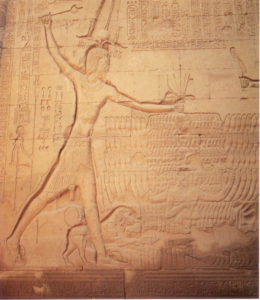 We do know that the embassies (e.g. Jews and Pagans from Alexandria) or trial must have taken place before Trajan left Rome in November 113 C.E. to make war on the Parthians.
We do know that the embassies (e.g. Jews and Pagans from Alexandria) or trial must have taken place before Trajan left Rome in November 113 C.E. to make war on the Parthians.
CPJUD. II 157, Col. 2
When the winter was over they arrived in Rome. The Emperor learned that the Jewish and Alexandrian envoys had arrived, and he appointed the day on which he would hear both parties. And Plotina (e.g. the wife of Trajan) approached the senators in order that they might oppose the Alexandrians and support the Jews. Now the Jews, who were the first to enter, greeted Emperor Trajan, and the Emperor returned their greeting most cordially, having been also won over by Plotina. After them the Alexandrian envoys entered and greeted to emperor. He, however, did not go to meet them, but said:
“Do you dare say ‘hail’ to me as though you deserved to receive a greeting―after what you have dared to do to the Jews?”
Here we have a Trajan who has become philo-Jewish by the good offices of his wife, who had pleaded the cause of the Alexandrian Jews. His reproachful words to the Greeks have aroused some curiosity among historians, who turned to Dio Chrysostom and numismatic testimony in search of an explanation… The Acts of the Alexandrians systematically accuse the imperial regime of siding with the Jews in their outgoing quarrel with the Greeks of Alexandria, and the passage quoted here may be a sort of general reference to this theme. The favoritism of Pompeia Plotina toward the Jews nourished this critical attitude, which was only heightened when the Empress, soon afterward, was suspected of playing a role in the adoption of Hadrian (and also of having become a Christian). But the imperial couple’s sympathy did not end here, as the following dialogue between Trajan and Hermaiskos (e.g. Alexandrian) shows:
CPJUD. II 157, COL. 3
[Trajan said:] “You must be eager to die, having such contempt for death as to answer even me with insolence.”
Hermaiskos said: “Why, it grieves us to see your Council filled with impious Jews.”
Caesar said: “This is the second time I am telling you, Hermaiskos: you are answering me insolently, taking advantage of your noble birth.”
Hermaiskos said: “What do you mean, I answer you insolently, greatest Emperor? Explain this to me.”
Caesar said: “Pretending that my Council is filled with Jews.”
Hermaiskos: “So, then, the word Jew is offensive to you? In that case you ought to help your own people and not play the advocate for the impious Jews.”
It is easy to conceive of the ill-will Hermaiskos bore to the Senate, as the Senators had been won over to the Jewish cause by the Empress Plotina. Hermaiskos heaped abuse upon the Senate, using the flimsy pretext that some of its members agreed to sit down next to a few Jews, on the Imperial Council.
The Imperial Council “filled with Jews”? Were not the Alexandrians carrying their anti-Judaism a bit too far? It would appear materially impossible for the Roman Senate to be the target of their accusations; yet the term employed here, synedrion (which appears as “Council” in the English translation of the papyrus), is an equivocal one: it could have referred to the Senate, along with the official Greek denomination sinkletos (or synkletos boule); but it could also have designated the Imperial Council (consilium principis), usually called symboulion. To be sure, there were no Jewish senators, but a faint trace of Jewish ancestry might be discernible in some members of the Imperial Council, for example, the descendants of Tiberius Julius Alexander.
Source: Joseph Mélèze Modrzejewski. The Jews of Egypt. (p. 194-197)